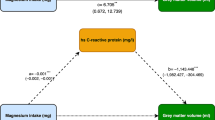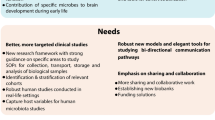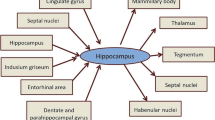Abstract
Patients with end-stage renal disease (ESRD) are notably accompanied by cognitive disorder and anxiety or depressive symptom. We aimed to explore the linkages of the amygdala-based MR parameters, cognitive and mood performance, systematic inflammation and gut microbiota in ESRD. This prospective study enrolled 28 ESRD patients (13 males and 15 females, mean age of 43.9 ± 13.8 years) and 19 age- and sex-matched healthy control (HC) (12 males and 7 females, mean age of 44.1 ± 10.0 years). All subjects underwent cognitive assessment, inflammatory factor and stool microbiota analysis, and brain MRI analysis [amygdala-based functional connectivity and voxel-based morphometry (VBM)]. ERSD was separated by different microbiota strains. All factors were compared between ESRD and HC, as well as between ESRD subgroups. Pearson correlation analysis and causal mediation analysis were conducted to further investigate the relationship among the factors derived from the gut microbiota, brain and systemic inflammation. ESRD displayed gut dysbiosis and increased systemic inflammation when compared to HC (all P < 0.05). Meanwhile, ESRD showed smaller VBM in amygdala, decreased functional connectivity in left amygdala - right inferior parietal lobe [P < 0.05, Gaussian Random Field (GRF) corrected] and worse cognitive or mood performance. Moreover, ESRD-B (Prevutella mainly), when compared to ESRD-A (Bacteroides mainly), displayed increased interleukin-6, self-rating anxiety scale and functional connectivity in left amygdala - bilateral anterior cingulate cortex / medial superior frontal cortex (P < 0.05, GRF corrected). Furthermore, the correlation network of ESRD showed that both gut dysbiosis and amygdala-based alteration were correlated with cognitive performance and systemic inflammation. Causal mediation analysis validated that the disrupted distribution of Roseburia indirectly regulated the amygdala-based functional connectivity through tumor necrosis factor-alpha. The gut dysbiosis induced by ESRD was closely related to pro-inflammatory cytokines, amygdala-based phenotype, and mood performance. The lower abundance in Roseburia indirectly modulated amygdala-based functional connectivity pattern by tumor necrosis factor-alpha, which might provide a new way in diagnosis and treatment in patients of ESRD with depressive/anxious mood.



Similar content being viewed by others
Abbreviations
- ACC:
-
anterior cingulate cortex
- CKD:
-
chronic kidney disease
- ESRD:
-
end-stage renal disease
- HC:
-
healthy control
- IFN-gamma:
-
interferon-gamma
- IL:
-
interleukin
- IPL:
-
inferior parietal lobe
- MMSE:
-
Mini-Mental State Examination
- MoCA:
-
Montreal Cognitive Assessment Scale
- MSFC:
-
medial superior frontal cortex
- NCT-A:
-
Number Connection Test type-A
- rs-fMRI:
-
resting-state functional magnetic resonance imaging
- SAS:
-
self-rating anxiety scale
- SDS:
-
self-rating depression scale
- SDT:
-
serial dotting test
- TNF-alpha:
-
tumor necrosis factor-alpha
- VBM:
-
voxel-based morphometry
References
Adesso, S., Magnus, T., Cuzzocrea, S., Campolo, M., Rissiek, B., Paciello, O., Autore, G., Pinto, A., & Cooper, D. (2017). Indoxyl sulfate affects glial function increasing oxidative stress and neuroinflammation in chronic kidney disease: interaction between astrocytes and microglia. Frontiers in Pharmacology, 8, 1–13. https://doi.org/10.3389/fphar.2017.00370.
Andersen, K., Kesper, M. S., Marschner, J. A., Konrad, L., Ryu, M., Kumar, V. S., Kulkarni, O. P., Mulay, S. R., Romoli, S., Demleitner, J., Schiller, P., Dietrich, A., Müller, S., Gross, O., Ruscheweyh, H.-J., Huson, D. H., Stecher, B., & Anders, H.-J. (2017). Intestinal dysbiosis, barrier dysfunction, and bacterial translocation account for CKD–related systemic inflammation. Journal of the American Society of Nephrology, 28, 76–83. https://doi.org/10.1681/ASN.2015111285.
J. Ashburner, (2010). VBM Tutorial. https://doi.org/10.1007/BF01908075.
Burke, J., McQuoid, D. R., Payne, M. E., Steffens, D. C., Krishnan, R. R., & Taylor, W. D. (2011). Amygdala volume in late-life depression: Relationship with age of onset. The American Journal of Geriatric Psychiatry, 19, 771–776. https://doi.org/10.1097/JGP.0b013e318211069a.
Catani, M., Dell’Acqua, F., & Thiebaut de Schotten, M. (2013). A revised limbic system model for memory, emotion and behaviour. Neuroscience and Biobehavioral Reviews, 37, 1724–1737. https://doi.org/10.1016/j.neubiorev.2013.07.001.
Charlton, R. A., Lamar, M., Zhang, A., Ren, X., Ajilore, O., Pandey, G. N., & Kumar, A. (2018). Associations between pro-inflammatory cytokines, learning, and memory in late-life depression and healthy aging. International Journal of Geriatric Psychiatry, 33, 104–112. https://doi.org/10.1002/gps.4686.
Chen, H. J., Wang, Y. F., Qi, R., & Schoepf, U. J. (2016). Altered amygdala resting-state functional connectivity in maintenance hemodialysis end-stage renal disease patients with depressive mood. Molecular Neurobiology, 54, 2223–2233. https://doi.org/10.1007/s12035-016-9811-8.
Chen, H. J., Wen, J., Qi, R., Zhong, J., Schoepf, U. J., Varga-Szemes, A., Lesslie, V. W., Kong, X., Wang, Y. F., Xu, Q., Zhang, Z., Li, X., Lu, G. M., & Zhang, L. J. (2018). Re-establishing brain networks in patients with ESRD after successful kidney transplantation. Clinical Journal of the American Society of Nephrology, 13, 109–117. https://doi.org/10.2215/CJN.00420117.
Crespo-Salgado, J., Vehaskari, V. M., Stewart, T., Ferris, M., Zhang, Q., Wang, G., Blanchard, E. E., Taylor, C. M., Kallash, M., Greenbaum, L. A., & Aviles, D. H. (2016). Intestinal microbiota in pediatric patients with end stage renal disease: A Midwest pediatric nephrology consortium study. Microbiome., 4, 50. https://doi.org/10.1186/s40168-016-0195-9.
Cullen, K. R., Westlund, M. K., Klimes-dougan, B., Mueller, B. A., Houri, A., Eberly, L. E., & Lim, K. O. (2014). Abnormal amygdala resting-state functional connectivity in adolescent depression. JAMA Psychiatry, 71, 1138–1147. https://doi.org/10.1001/jamapsychiatry.2014.1087.
Dantzer, R., O'Connor, J. C., Freund, G. G., Johnson, R. W., & Kelley, K. W. (2008). From inflammation to sickness and depression: when the immune system subjugates the brain. Nature Reviews Neuroscience, 9, 46–56. https://doi.org/10.1038/nrn2297.
de Paus, R. A., van Wengen, A., Schmidt, I., Visser, M., Verdegaal, E. M. E., van Dissel, J. T., & van de Vosse, E. (2013). Inhibition of the type I immune responses of human monocytes by IFN-α and IFN-β. Cytokine., 61, 645–655. https://doi.org/10.1016/j.cyto.2012.12.005.
Donzis, E. J., & Tronson, N. C. (2014). Modulation of learning and memory by cytokines: Signaling mechanisms and long term consequences. Neurobiology of Learning and Memory, 115, 68–77. https://doi.org/10.1016/j.nlm.2014.08.008.
Escolano, C., Navarro-Gil, M., Garcia-Campayo, J., Congedo, M., De Ridder, D., & Minguez, J. (2014). A controlled study on the cognitive effect of alpha neurofeedback training in patients with major depressive disorder. Frontiers in Behavioral Neuroscience, 8. https://doi.org/10.3389/fnbeh.2014.00296.
Foster, J. A., Rinaman, L., & Cryan, J. F. (2017). Neurobiology of stress stress & the gut-brain axis: Regulation by the microbiome. Neurobiology of Stress, 7, 124–136. https://doi.org/10.1016/j.ynstr.2017.03.001.
Franke, T., & Deppenmeier, U. (2018). Physiology and central carbon metabolism of the gut bacterium Prevotella copri. Molecular Microbiology, 109, 528–540. https://doi.org/10.1111/mmi.14058.
Garg, M., & Ooi, C. Y. (2017). The enigmatic gut in cystic fibrosis: Linking inflammation, dysbiosis, and the increased risk of malignancy. Current Gastroenterology Reports, 19, 6. https://doi.org/10.1007/s11894-017-0546-0.
Glennon, E., Kaunzner, U. W., Gagnidze, K., McEwen, B. S., & Bulloch, K. (2015). Pituitary dendritic cells communicate immune pathogenic signals. Brain, Behavior, and Immunity, 50, 232–240. https://doi.org/10.1016/j.bbi.2015.07.007.
Hedayati, S. S., Minhajuddin, A. T., Afshar, M., Toto, R. D., Trivedi, M. H., & Rush, A. J. (2010). Association between major depressive episodes in patients with chronic kidney disease and initiation of dialysis, hospitalization, or death. JAMA., 303, 1946–1953. https://doi.org/10.1001/jama.2010.619.
Hedayati, S. S., Yalamanchili, V., & Finkelstein, F. O. (2012). A practical approach to the treatment of depression in patients with chronic kidney disease and end-stage renal disease. Kidney International, 81, 247–255. https://doi.org/10.1038/ki.2011.358.
Heisler, J. M., & O’Connor, J. C. (2015). Indoleamine 2,3-dioxygenase-dependent neurotoxic kynurenine metabolism mediates inflammation-induced deficit in recognition memory. Brain, Behavior, and Immunity, 50, 115–124. https://doi.org/10.1016/j.bbi.2015.06.022.
Hill, C., Guarner, F., Reid, G., Gibson, G. R., Merenstein, D. J., Pot, B., Morelli, L., Canani, R. B., Flint, H. J., Salminen, S., Calder, P. C., & Sanders, M. E. (2014). Expert consensus document: The international scientific association for probiotics and prebiotics consensus statement on the scope and appropriate use of the term probiotic. Nature Reviews Gastroenterology & Hepatology, 11, 506–114. https://doi.org/10.1038/nrgastro.2014.66.
Honea, R. A., Vidoni, E., Harsha, A., & Burns, J. M. (2009). Impact of APOE on the healthy aging brain: A voxel-based MRI and DTI study. Journal of Alzheimer’s Disease, 18, 553–564. https://doi.org/10.3233/JAD-2009-1163.
Hopwood, M. J. (2013). Depression and physical illness. The Medical Journal of Australia, 199, S9–S12. https://doi.org/10.5694/mjao12.10597.
Janak, P. H., & Tye, K. M. (2015). From circuits to behaviour in the amygdala. Nature, 517, 284–292. https://doi.org/10.1038/nature14188.
Janik, R., Thomason, L. A. M., Stanisz, A. M., Forsythe, P., Bienenstock, J., & Stanisz, G. J. (2016). Magnetic resonance spectroscopy reveals oral Lactobacillus promotion of increases in brain GABA, N-acetyl aspartate and glutamate. Neuroimage, 125, 988–995. https://doi.org/10.1016/j.neuroimage.2015.11.018.
Jiang, S., Xie, S., Lv, D., Zhang, Y., Deng, J., Zeng, L., & Chen, Y. (2016). A reduction in the butyrate producing species Roseburia spp. and Faecalibacterium prausnitzii is associated with chronic kidney disease progression. Antonie Van Leeuwenhoek, 109, 1389–1396. https://doi.org/10.1007/s10482-016-0737-y.
Jiang, S., Xie, S., Lv, D., Wang, P., He, H., Zhang, T., Lin, Q., Zhou, H., Jiang, J., Nie, J., Hou, F., & Chen, Y. (2017a). Alteration of the gut microbiota in Chinese population with chronic kidney disease. Scientific Reports, 7, 1–10. https://doi.org/10.1038/s41598-017-02989-2.
Jiang, C., Li, G., Huang, P., Liu, Z., & Zhao, B. (2017b). The gut microbiota and Alzheimer’s disease. Journal of Alzheimer’s Disease, 58, 1–15. https://doi.org/10.3233/JAD-161141.
Kim, Y. K., Amidfar, M., & Won, E. (2019). A review on inflammatory cytokine-induced alterations of the brain as potential neural biomarkers in posttraumatic stress disorder. Progress in Neuro-Psychopharmacology and Biological Psychiatry, 91, 103–112. https://doi.org/10.1016/j.pnpbp.2018.06.008.
Kurella, M., Yaffe, K., Shlipak, M. G., Wenger, N. K., & Chertow, G. M. (2005). Chronic kidney disease and cognitive impairment in menopausal women. American Journal of Kidney Diseases, 45, 66–76. https://doi.org/10.1053/j.ajkd.2004.08.044.
Ley, R. E. (2016). Gut microbiota in 2015: Prevotella in the gut: Choose carefully. Nature Reviews. Gastroenterology & Hepatology, 13, 69–70. https://doi.org/10.1038/nrgastro.2016.4.
Li, A., Mu, J., Huang, M., Zhang, Z., Liu, J., & Zhang, M. (2018). Altered amygdala-related structural covariance and resting-state functional connectivity in end-stage renal disease patients. Metabolic Brain Disease, 33, 1471–1481. https://doi.org/10.1007/s11011-018-0254-y.
Ling, Z., Jin, C., Xie, T., Cheng, Y., Li, L., & Wu, N. (2016). Alterations in the fecal microbiota of patients with HIV-1 infection: An observational study in a Chinese population. Scientific Reports, 6, 30673. https://doi.org/10.1038/srep30673.
Maldjian, J. A., Laurienti, P. J., Kraft, R. A., & Burdette, J. H. (2003). An automated method for neuroanatomic and cytoarchitectonic atlas-based interrogation of fMRI data sets. Neuroimage, 19, 1233–1239. https://doi.org/10.1016/S1053-8119(03)00169-1.
Mańkowska, A., Heilman, K. M., Williamson, J. B., Biedunkiewicz, B., Dȩbska-Ślizień, A., & Harciarek, M. (2017). Leftward bias of visual attention in patients with end-stage renal disease receiving dialysis: A neglected phenomenon. Cognitive and Behavioral Neurology, 30, 176–181. https://doi.org/10.1097/WNN.0000000000000142.
Marvi, A., Bayazi, M. H., Rahmani, M., & Deloei, A. K. (2011). Studying the effect of cognitive behavioral group training on depression in hemodialysis patients. Procedia – Social and Behavioral Sciences, 30, 1831–1836. https://doi.org/10.1016/j.sbspro.2011.10.353.
McIntyre, C. W., Harrison, L. E. A., Eldehni, M. T., Jefferies, H. J., Szeto, C.-C., John, S. G., Sigrist, M. K., Burton, J. O., Hothi, D., Korsheed, S., Owen, P. J., Lai, K.-B., & Li, P. K. T. (2011). Circulating endotoxemia: A novel factor in systemic inflammation and cardiovascular disease in chronic kidney disease. Clinical Journal of the American Society of Nephrology, 6, 133–141. https://doi.org/10.2215/CJN.04610510.
Moreira, J. M., Bouissou Morais Soares, C. M., Teixeira, A. L., Simões E Silva, A. C., & Kummer, A. M. (2015). Anxiety, depression, resilience and quality of life in children and adolescents with pre-dialysis chronic kidney disease. Pediatric Nephrology, 30, 2153–2162. https://doi.org/10.1007/s00467-015-3159-6.
Mu, J., Chen, T., Liu, Q., Ding, D., Ma, X., Li, P., Li, A., Huang, M., Zhang, Z., Liu, J., & Zhang, M. (2018). Abnormal interaction between cognitive control network and affective network in patients with end-stage renal disease. Brain Imaging and Behavior, 12, 1099–1111. https://doi.org/10.1007/s11682-017-9782-z.
Müller, V. I., Cieslik, E. C., Laird, A. R., Fox, P. T., & Eickhoff, S. B. (2013). Dysregulated left inferior parietal activity in schizophrenia and depression: Functional connectivity and characterization. Frontiers in Human Neuroscience, 7, 268. https://doi.org/10.3389/fnhum.2013.00268.
Munshi, S., & Rosenkranz, J. A. (2018). Effects of peripheral immune challenge on in vivo firing of Basolateral amygdala neurons in adult male rats. Neuroscience, 390, 174–186. https://doi.org/10.1016/j.neuroscience.2018.08.017.
O’Connor, J. C., Lawson, M. A., André, C., Moreau, M., Lestage, J., Castanon, N., Kelley, K. W., & Dantzer, R. (2009). Lipopolysaccharide-induced depressive-like behavior is mediated by indoleamine 2,3-dioxygenase activation in mice. Molecular Psychiatry, 14, 511–522. https://doi.org/10.1038/sj.mp.4002148.
Palmer, S., Vecchio, M., Craig, J. C., Tonelli, M., Johnson, D. W., Nicolucci, A., Pellegrini, F., Saglimbene, V., Logroscino, G., Fishbane, S., & Strippoli, G. F. M. (2013). Prevalence of depression in chronic kidney disease: Systematic review and meta-analysis of observational studies. Kidney International, 1–13. https://doi.org/10.1038/ki.2013.77.
Pan, W., & Kang, Y. (2017). Gut microbiota and chronic kidney disease: Implications for novel mechanistic insights and therapeutic strategies. International Urology and Nephrology, 50, 289–299. https://doi.org/10.1007/s11255-017-1689-5.
Ramezani, A., & Raj, D. S. (2014). The gut microbiome, kidney disease, and targeted interventions. Journal of the American Society of Nephrology, 25, 657–670. https://doi.org/10.1681/ASN.2013080905.
Richards, E. M., & Pepine, C. J. (2018). The gut microbiota and the brain–gut–kidney axis in hypertension and chronic kidney disease. Nature Reviews. Nephrology, 14, 442–456. https://doi.org/10.1038/s41581-018-0018-2.
Rolls, E. T. (2015). Limbic systems for emotion and for memory, but no single limbic system. Cortex., 62, 119–157. https://doi.org/10.1016/j.cortex.2013.12.005.
Schachter, J., Martel, J., Lin, C., Chang, C., Wu, T., Lu, C., Ko, Y., Lai, H., Ojcius, D. M., & Young, J. D. (2017). Effects of obesity on depression: A role for inflammation and the gut microbiota. Brain, Behavior, and Immunity. https://doi.org/10.1016/j.bbi.2017.08.026.
Scher, J. U., Sczesnak, A., Longman, R. S., Segata, N., Ubeda, C., Bielski, C., Rostron, T., Cerundolo, V., Pamer, E. G., Abramson, S. B., Huttenhower, C., & Littman, D. R. (2013). Expansion of intestinal Prevotella copri correlates with enhanced susceptibility to arthritis. Elife, 2, e01202. https://doi.org/10.7554/eLife.01202.
Sharp, R. (2015). The hamilton rating scale for depression. Occupational Medicine (Chicago), 65, 340. https://doi.org/10.1093/occmed/kqv043.
Souza, L. C., Jesse, C. R., de Gomes, M. G., Viana, C. E., Mattos, E., Silva, N. C., & Boeira, S. P. (2017). Intracerebroventricular administration of streptozotocin as an experimental approach to depression: Evidence for the involvement of proinflammatory cytokines and indoleamine-2,3-dioxygenase. Neurotoxicity Research, 31, 464–477. https://doi.org/10.1007/s12640-016-9691-8.
Stevens, B. R., Goel, R., Seungbum, K., Richards, E. M., Holbert, R. C., Pepine, C. J., & Raizada, M. K. (2018). Increased human intestinal barrier permeability plasma biomarkers zonulin and FABP2 correlated with plasma LPS and altered gut microbiome in anxiety or depression. Gut, 67, 1555–1557. https://doi.org/10.1136/gutjnl-2017-314759.
Stilling, R. M., Ryan, F. J., Hoban, A. E., Shanahan, F., Clarke, G., Claesson, M. J., Dinan, T. G., & Cryan, J. F. (2015). Microbes & neurodevelopment - absence of microbiota during early life increases activity-related transcriptional pathways in the amygdala. Brain, Behavior, and Immunity, 50, 209–220. https://doi.org/10.1016/j.bbi.2015.07.009.
Strle, K., McCusker, R. H., Tran, L., King, A., Johnson, R. W., Freund, G. G., Dantzer, R., & Kelley, K. W. (2007). Novel activity of an anti-inflammatory cytokine: IL-10 prevents TNFα-induced resistance to IGF-I in myoblasts. Journal of Neuroimmunology, 188, 48–55. https://doi.org/10.1016/j.jneuroim.2007.05.003.
Ventura, J., Subotnik, K. L., Ered, A., Gretchen-Doorly, D., Hellemann, G. S., Vaskinn, A., & Nuechterlein, K. H. (2014). The relationship of attitudinal beliefs to negative symptoms, neurocognition, and daily functioning in recent-onset schizophrenia. Schizophrenia Bulletin. https://doi.org/10.1093/schbul/sbu002.
Yan, C. G., Di Wang, X., Zuo, X. N., & Zang, Y. F. (2016). DPABI: Data Processing & Analysis for (resting-state) brain imaging. Neuroinformatics, 14, 339–351. https://doi.org/10.1007/s12021-016-9299-4.
Zheng, H., Li, F., Bo, Q., Li, X., Yao, L., Yao, Z., Wang, C., & Wu, X. (2018). The dynamic characteristics of the anterior cingulate cortex in resting-state fMRI of patients with depression. Journal of Affective Disorders, 227, 391–397. https://doi.org/10.1016/j.jad.2017.11.026.
Availability of data and materials
The datasets used and/or analyzed during the current study are available from the corresponding author on reasonable request.
Funding
This work was supported by the grants from the Natural Scientific Foundation of China (81,322,020 and 81,230,032 to Long Jiang Zheng; 81,801,686 to Li Juan Zheng).
Author information
Authors and Affiliations
Contributions
LJZ, GL and DG conceived and designed the experiments. LJ, LL, ZHZ, YFW, YBY, YL and XYZ performed the experiments. LJ, LL, JZ, YL, and LJZ analyzed the data and wrote the paper. All authors read and approved the final manuscript.
Corresponding authors
Ethics declarations
Ethics approval and consent to participate
All procedures followed the tenets of the Declaration of Helsinki and were approved by the Ethics Committee of Jinling Hospital, Medical School of Nanjing University with written informed consent.
Consent for publication
Not applicable.
Competing interests
The authors declare that they have no competing interests.
Additional information
Publisher’s note
Springer Nature remains neutral with regard to jurisdictional claims in published maps and institutional affiliations.
Electronic supplementary material
ESM 1
(DOCX 612 kb)
Rights and permissions
About this article
Cite this article
Zheng, L.J., Lin, L., Zhong, J. et al. Gut dysbiosis-influence on amygdala-based functional activity in patients with end stage renal disease: a preliminary study. Brain Imaging and Behavior 14, 2731–2744 (2020). https://doi.org/10.1007/s11682-019-00223-3
Published:
Issue Date:
DOI: https://doi.org/10.1007/s11682-019-00223-3




